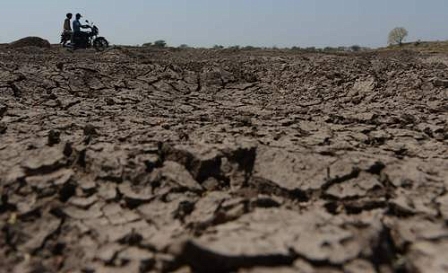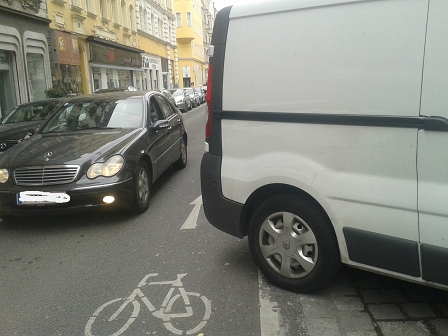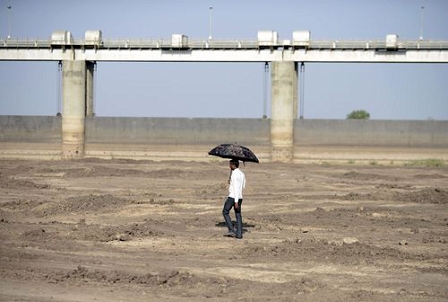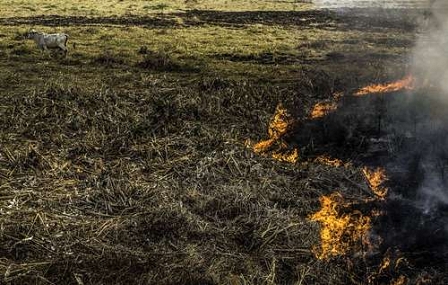Erstellt am: 22. 4. 2016 - 11:00 Uhr
"We need a new sort of politics"
Reality Check am Earth Day
Am 22. April von 12-14h und im Anschluss im 7-Tage-Player.
We need action on climate change. It is a moral, ethical, financial, economic and political imperative. We cannot afford to wait any longer.
On the 22nd of April, 4 months after the 196 parties to the United Nations Framework Convention on Climate Change reached an historic agreement to combat climate change, a symbolic ceremony will take place at UN Headquarters in New York with representatives of 155 of those countries formally signing the document.
The host, UN Secretary General Ban Ki Moon, hopes the event, which coincides with the annual Earth Day, will encourage global leaders to put the new agreement into practice.

AFP PHOTO / SAM PANTHAKY
Implementation is "crucial for human well-being"
Weiterlesen
Wettlauf mit dem Klimawandel: Was tut sich in Österreich in Sachen Klimaschutz?
If they do, there is a chance that the champagne-soaked diplomatic success from last December actually becomes an ecological success that might stop a global catastrophe that, as the talks stalled for years, had seemed an inevitability.
As economist Jeffrey Sachs, who I met at IIASA at Laxenburg, told me: "It is crucial for human well-being that we implement it, that doesn’t guarantee we will, but it is crucial that we do. With the signing on April 22nd every government around the world should be presenting to its public their plans on how to decarbonize."
Although, in Paris, the Austrian environment minister Andrä Rupprechter told me the agreement would lead to a "transformation in energy and mobility policy," four months on, policy seems to be exactly the same as before.

Chris Cummins
$500 billion in fossil fuel subsidies annually
Across Europe, more motorways are being planned, bigger car parks are being built, fossil fuels continue to be subsidized (the global value of fossil-fuel subsidies worldwide totalled $493 billion in 2014). In the UK, they are upholding fossil fuel subsidies while slashing renewable ones. Across the world, coal-fired power stations continue to be built and forests are being felled for palm oil plantations.
In Austria, let’s be fair, we do get the odd new "cycle path" - but, if you ask me, drawing a white line that is wholly ignored by parked and moving cars is hardly going to wean us off our addiction to the combustion engine.
I have no experience of revolutions, but I was expecting it to be visible in some way.
World society will be "seriously destabilized"
Sachs urges patience, but, then again, not too much patience:
"We have to shift to zero carbon energy completely by the second half of this century. That’s a long and very difficult process. It won’t happen from one day to the next. But if we don’t get started in a very serious and consequent way we will create a global warming that is so dangerous that it will destabilize world society and the global ecosystem in a very profound way."
We are reliant on political leaders to pass the necessary legislation that could avoid such disaster and they need us to vote them back into office every four of five years once they take those steps.
Fierce lobbying
But as Sachs points, our governments are held back by fear of challenging a status quo that is supported by fierce lobbying from the industrial elite. They keep subsidizing fossil fuels, because they think that is what we want, they keep building car parks, because they believe that is what we want.
Sometimes it is much murkier than that.
Sachs says that in the USA, politicians who get large campaign donations from oil companies, dream of getting funded by the oil-company owning Koch brothers who have already said they are going to donate around $1 billion in the upcoming election. According to Sachs that makes Republican politicians "prepared to lie, even of the safety of their children and grandchildren, in order to get that oil money."

AFP PHOTO / SAM PANTHAKY
"A long transmission belt to safety"
So what we really need is a different sort of politics and a different sort of politicians. They need to show two rare qualities: courage and a vision that goes well beyond the narrow boundaries of their time in office. "This is a different form of governing", says Sachs, "it is not about winning the next election; it’s actually about securing the planet." No democratic political force, facing election every four of five years, can expect to be in power for anything but a fraction of the process we need to see.
A responsible politician says Sachs, needs to view their work as "a long transmission belt to the safety of my country which is part of the safety of the world."
That means putting a serious process in place and trusting their successors in office are responsible enough to continue that process. "The transformation needed is very deep and demands a lot of sophisticated planning. It demands a lead time to be able to plan, look ahead and implement a strategy that will last thirty or forty years. Our politicians are almost incapable of this but they should be capable of putting into motion the process to achieve this."

AFP PHOTO / JOAQUIN SARMIENTO
Sachs says governments need to ensure the best engineers in the country are co-operating with the best engineers in the region to solve problems. It requires explaining to the voting public that the beloved status quo, our fossil fuel based economy, is not a comfort zone but rather a death trap and that changes will have to be made.
"Politicians have probably never done this kind of thing ever in their careers," says Sachs.
It is no exaggeration to say that the survival of humanity depends on them breaking the mould.


